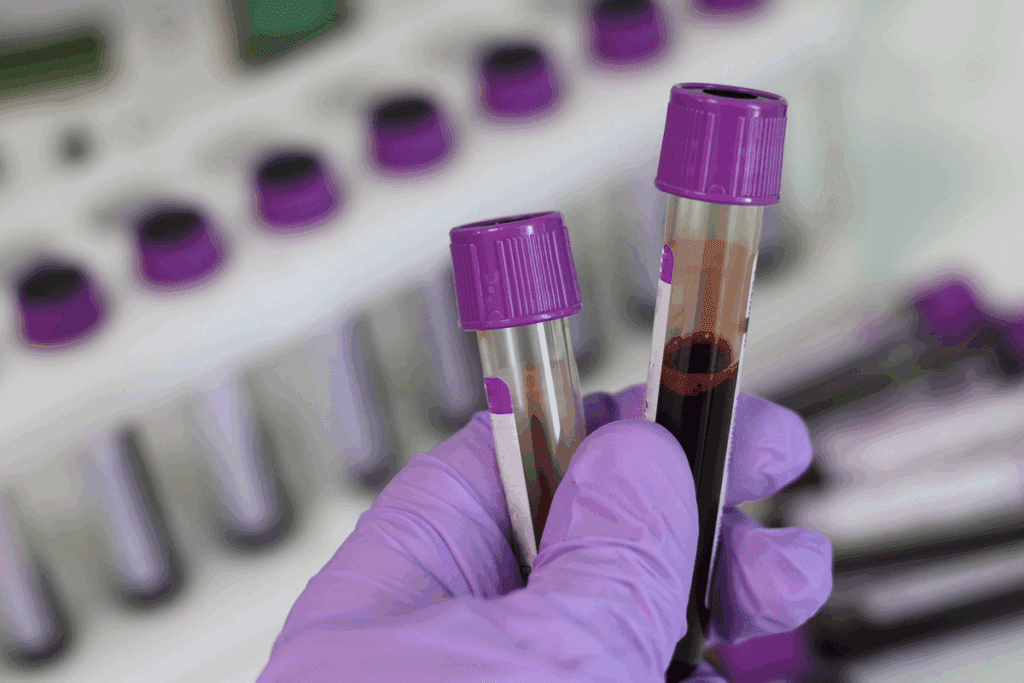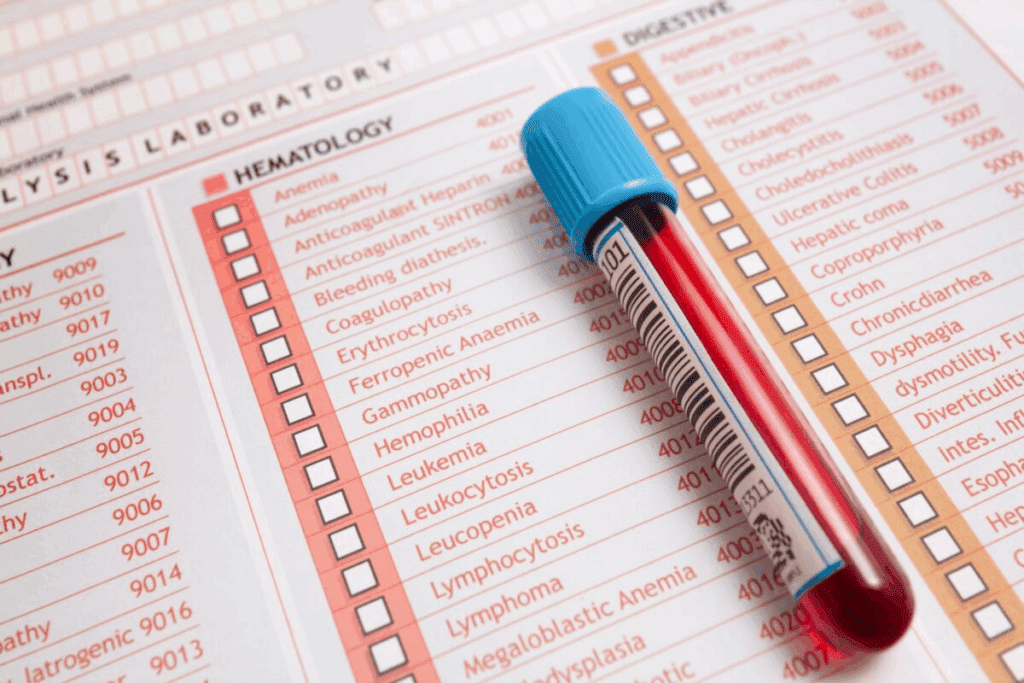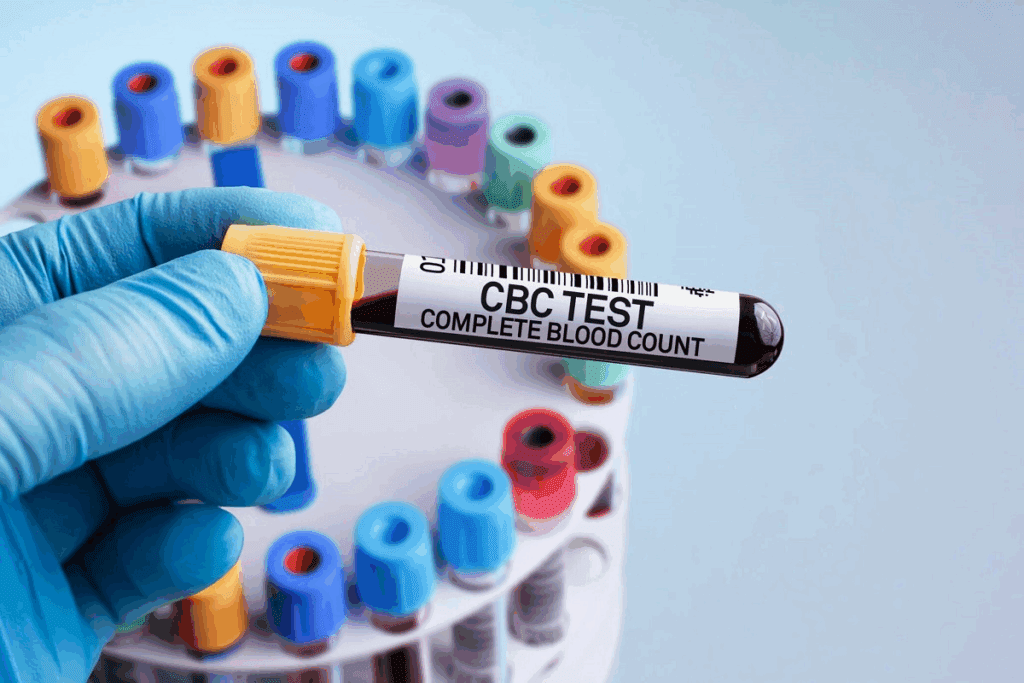Last Updated on October 21, 2025 by mcelik

A complete blood count is a common test to check overall health. It helps find issues like anemia, infections, and even leukemia.Why did your physician order a CBC test? Discover 5 crucial reasons this amazing and powerful lab is essential for diagnosis.
Doctors usually do this blood work during routine check-ups or to keep an eye on ongoing health problems. The test shows how well the body fights off infections and the health of blood cells.
Knowing about a complete blood count check is key. It shows how important this test is in healthcare.

The CBC test is key in checking blood cells and their health impact. It’s a detailed test that looks at different blood parts. This gives doctors important info on a patient’s health.
A CBC test counts and checks blood cells like red blood cells (RBCs), white blood cells (WBCs), and platelets. It helps find many health issues, from anemia to leukemia.
The CBC test looks at several important things:
The CBC test has changed a lot over time. It went from manual counting to using advanced machines. This change made CBC testing more accurate and quicker. Now, it’s a key test in medicine, helping diagnose and manage many health issues.
CBC tests are key for both routine check-ups and for finding health problems. A CBC, or Complete Blood Count, checks the blood for red, white cells, and platelets.
Doctors often use CBC tests for routine health screenings. These tests check your health and find problems early. A CBC can spot issues like anemia or infection before you even feel sick.
CBC tests are vital for diagnosing specific conditions. They can show if you have anemia, infection, or leukemia. Doctors use these tests to figure out what’s wrong and what to do next.
For people with ongoing health problems, CBC tests help monitor their condition. This is key for those with chronic illnesses or on treatments that affect blood cells. Regular tests let doctors adjust treatment plans as needed.
Some medicines can harm blood cell production, so CBC tests are needed. This is true for drugs that can cause bone marrow suppression. By watching CBC results, doctors can better handle side effects.
| Reason for CBC Test | Description |
| Routine Health Screenings | Assess overall health and detect problems early. |
| Diagnosing Specific Conditions | Find issues like anemia, infection, or leukemia. |
| Monitoring Existing Health Issues | Keep track of chronic illnesses or treatment effects. |
| Medication Management | Watch how certain medicines affect blood cells. |

Red blood cell measurements are key in a Complete Blood Count (CBC) test. They show how well the body carries oxygen. These details help doctors diagnose and track health issues.
The Red Blood Cell Count, or RBC, shows the number of red blood cells in the blood. A normal count means the body is making enough red blood cells. But an abnormal count might mean anemia or polycythemia.
Hemoglobin is a protein in red blood cells that carries oxygen. It’s measured to see how well the blood carries oxygen. Low levels can mean anemia or other health problems.
The hematocrit percentage shows the amount of red blood cells in the blood. It’s key to know how well the body transports oxygen. An odd percentage can point to dehydration, anemia, or other issues.
Red cell indices like Mean Corpuscular Volume (MCV), Mean Corpuscular Hemoglobin (MCH), and Mean Corpuscular Hemoglobin Concentration (MCHC) give detailed info. They tell about red blood cell size and hemoglobin. These help find specific anemia types and other red blood cell problems.
Knowing about these red blood cell measurements is key to understanding CBC test results. Doctors use these details to see a patient’s health clearly. They can then decide on more tests or treatment.
White blood cell analysis is key in the Complete Blood Count (CBC) test. It shows how the body fights off infections. It also helps find inflammatory conditions and immune system problems.
The total white blood cell (WBC) count shows how many WBCs are in the blood. If there are more WBCs, it might mean an infection or inflammation. Fewer WBCs could mean a weak immune system or bone marrow issues.
A differential count, or diff, breaks down the different white blood cells in the blood. It looks at neutrophils, lymphocytes, monocytes, eosinophils, and basophils. Each type of WBC has a special role in fighting off infections. Their numbers can tell us a lot about what’s going on with a patient.
Neutrophils are the most common WBC and fight bacterial infections. Lymphocytes are important in fighting viruses and keeping the immune system balanced. Monocytes turn into macrophages, which clean up debris and foreign substances. Eosinophils help with parasitic infections and allergic reactions. Basophils are the least common and are linked to inflammation, mainly in allergies.
Abnormal WBC counts can point to different health issues. For example, more neutrophils might mean a bacterial infection. More lymphocytes could mean a viral infection. Fewer WBCs could mean bone marrow failure or a severe infection. Knowing these patterns helps doctors diagnose and treat patients better.
By looking at white blood cells in a CBC test, doctors can understand a patient’s immune response. This helps them spot health problems early. It’s important for planning further tests and treatments.
Understanding platelet count and function is key to diagnosing bleeding and clotting issues. Platelets help form clots to stop bleeding. A CBC test measures platelet count, essential for clotting and stopping bleeding.
A normal platelet count is between 150,000 to 450,000 per microliter of blood. This range might vary slightly by lab, but it stays close. A platelet count in this range is important for blood clotting.
Normal Platelet Count: 150,000 – 450,000 platelets/μL
Thrombocytopenia means having too few platelets. It can come from bone marrow problems, some meds, or autoimmune diseases. It raises the risk of bleeding, from small bruises to severe hemorrhages.
Causes of Thrombocytopenia:
Thrombocytosis occurs when the platelet count re too high. It can be caused by infections, inflammation, or cancer. High platelet counts can lead to blood clots, serious conditions like deep vein thrombosis, or stroke.
| Causes of Thrombocytosis | Potential Risks |
| Infections | Blood clots |
| Inflammation | Deep vein thrombosis |
| Cancer | Stroke |
The Mean Platelet Volume (MPV) shows the average platelet size. High MPV means larger, more reactive platelets, linked to clotting risk. Low MPV suggests smaller platelets, often from bone marrow issues.
A medical expert notes, “Assessing platelet count and function through a CBC test is key for managing bleeding and clotting disorders.” This highlights the importance of platelet assessment in medical practice.
“Platelet count is a vital parameter in the CBC test, providing insights into the body’s hemostatic balance.”
Diagnosing anemia often starts with a Complete Blood Count (CBC) test. This test is key in modern medicine. Anemia is when there are not enough red blood cells to carry oxygen.
A CBC test gives a detailed look at blood health. It checks for anemia by looking at red blood cells.
A CBC can spot different anemia types. Iron deficiency anemia, vitamin deficiency anemia, and anemia of chronic disease can be found. Each has its own signs that a CBC can detect.
The CBC looks at several important parts of blood. These parts help find anemia:
Healthcare providers look at certain markers in CBC results for anemia. Hemoglobin levels are key, as low levels mean anemia. The MCV is also important. It helps classify anemia based on red blood cell size.
Even with a CBC, more tests might be needed to find the cause. Tests like iron studies, vitamin level assessments, and bone marrow biopsies are used. They help find the cause and plan treatment.
CBC results are key for diagnosing and tracking anemia treatment. Regular CBC tests show changes in red blood cells and hemoglobin. This helps adjust treatment for the best results.
CBC tests are key in finding and tracking infections. They look at blood components to help doctors diagnose and treat infections.
CBC tests can tell if an infection is bacterial or viral. Bacterial infections raise neutrophils, a white blood cell type. Viral infections increase lymphocytes. Knowing this helps doctors choose the right treatment.
“The CBC is a valuable tool in the diagnosis of infections, providing critical information about the body’s response to infection,” says a medical expert. This is important because it helps doctors pick the right treatment, like antibiotics or antiviral meds.
The CBC test shows signs of inflammation. A high white blood cell count means there’s an infection or inflammation. ESR and CRP levels also help measure how severe the inflammation is.
CBC tests help track recovery, too. By watching white blood cell counts, doctors see how well treatment is working. A drop in WBC count means recovery is happening. But if counts stay high or go up, it might mean treatment isn’t working.
Even with CBC tests, some infections need more tests. If symptoms don’t get better or get worse, doctors might do blood cultures, imaging, or molecular tests. These help find the real cause.
In summary, CBC tests are essential for finding and tracking infections. By understanding infection patterns and tracking the body’s response, doctors can give better care.
A Complete Blood Count (CBC) test is key for spotting blood disorders. It looks at the blood’s parts to see if health is okay. This helps find issues that need a doctor’s care.
Leukemia, a blood cancer, shows up in CBC tests. If white blood cells are too high or too low, it might be leukemia. Symptoms include feeling tired, losing weight, and getting sick a lot. A CBC can spot these signs, leading to more tests.
Polycythemia means too many red blood cells, making the blood thick. A CBC finds high hematocrit levels, which might mean polycythemia. This can lead to blood clots and heart problems. Keeping an eye on hematocrit with CBC tests is key to managing it.
Myelodysplastic syndromes (MDS) happen when the bone marrow doesn’t work properly. CBC tests show blood cell issues that might mean MDS. Symptoms include anemia, infections, and bleeding problems. Finding MDS early with CBC helps doctors act fast.
Hemoglobinopathies and thalassemias affect how hemoglobin is made. A CBC checks red blood cells and hemoglobin levels. Odd results might show these disorders, leading to more tests. CBCs are important for managing these and avoiding serious issues.
In short, CBC tests are great for finding blood disorders. They help doctors see if something’s wrong with blood. Regular CBCs help keep an eye on health and guide treatment.
Knowing what a CBC test is can make you feel more at ease. A CBC, or Complete Blood Count, checks your blood’s different parts. This includes red and white blood cells and platelets.
Many wonder if they need to fast before a CBC test. Fasting is not required for a CBC because it looks at your blood’s parts. But your doctor might ask you to fast if you’re having other tests too, like a blood sugar test.
Telling your doctor about your medications is key. Some meds can change your blood test results. Your doctor will tell you if you should keep taking your meds as usual or make any changes before the test.
A healthcare professional will take a blood sample from your arm for a CBC test. It’s quick and doesn’t hurt much. You might feel a pinch when the needle goes in. After, you might see some bruising or bleeding, but it’s usually small.
How often you need a CBC test depends on your health and why you’re getting tested. Your doctor will decide when and how often you need a CBC. This could be for regular checks, to diagnose something, or to see how treatment is going.
Understanding these points can help you feel more ready for your CBC test. It can make the experience less stressful and smoother.
The CBC test process includes blood collection, lab analysis, and result processing. Knowing these steps shows the test’s complexity and importance.
Blood for a CBC test is taken from a vein in the arm. The process is fast and usually doesn’t hurt much. Venipuncture, the term for this, uses sterile tools to avoid infection.
The vein and method used can change based on the patient and the doctor’s skill. Sometimes, a capillary blood sample is taken, like in babies or certain medical situations.
After blood collection, it goes to a lab for analysis. Labs use automated analyzers for CBC tests. These machines can handle many samples at once, giving detailed blood information.
The analysis checks blood cell levels, like red and white blood cells, and platelets. It also looks at hemoglobin level and hematocrit percentage.
The differential count is key in a CBC. It shows the types and numbers of white blood cells. Modern analyzers do an automated differential count, giving fast and accurate results.
At times, a manual differential count is done. This is when the automated results are odd or there are specific health concerns. A lab technician then looks at a blood smear under a microscope to count the cells.
How long it takes to get CBC test results varies. It usually takes a few hours to a day. Stat CBC tests, which are urgent, get done faster, often in under an hour.
| Test Component | Typical Turnaround Time | Stat Turnaround Time |
| CBC with Differential | 4-24 hours | 1-2 hours |
| CBC without Differential | 2-12 hours | 30 minutes to 1 hour |
Knowing how a CBC test works can ease worries. Also, fasting is not needed for a CBC test, making it easy to get.
CBC testing is used in many groups, like kids, pregnant women, older adults, and athletes. Each group has its own needs. A CBC medical exam helps doctors understand their health better.
In kids, CBC tests help find and track many health issues. These include anemia, infections, and blood disorders. It’s important to look at age-specific values when reading test results.
Pregnancy changes a woman’s body in many ways. These changes can affect CBC test results. It’s important to understand these changes for accurate results.
In older adults, CBC testing can spot age-related changes and diagnose common conditions. These include anemia, chronic diseases, or myelodysplastic syndromes.
Athletes and those who are very active might get CBC tests. This is to check their health or to look into symptoms like fatigue or muscle cramps.
It’s key for doctors to understand CBC test results in these groups. By knowing the special needs of each group, doctors can give better care. This helps improve health outcomes for everyone.
CBC testing is key in modern medicine. It gives important information for many health issues. Knowing what a complete blood count means is vital for both doctors and patients.
Patients often ask if they need to fast before a CBC test. Usually, fasting is not needed. But it’s best to follow your doctor’s advice.
A CBC lab test is a basic tool in healthcare. It helps doctors diagnose and manage many conditions. By looking at CBC test results, doctors can understand a patient’s health better.
In short, the CBC test is essential in today’s medicine. It provides vital information for patient care and treatment plans.
A CBC, or Complete Blood Count, is a blood test. It checks the blood’s different parts, like red and white blood cells, platelets, and hemoglobin.
Doctors order CBC tests for many reasons. They do it for routine health checks, to diagnose conditions, to keep an eye on health issues, and to manage medicines.
A CBC test looks at several blood parts. It checks red blood cell count, white blood cell count, platelet count, and hemoglobin levels. It also looks at hematocrit percentage and red cell indices.
Usually, you don’t need to fast for a CBC test. But it’s best to follow what your healthcare provider tells you.
A CBC test can spot many conditions. It can find anemia, infections, blood disorders, and some cancers like leukemia.
Getting a CBC test involves a blood draw. A healthcare professional takes blood from a vein, usually in your arm.
CBC test results take different times to come back. It depends on the lab. But you usually get them in a few hours to a few days.
Normal CBC test results change based on age, sex, and health history. Your doctor will look at your results and your health together.
A CBC test isn’t a sure way to find cancer. Bu, it can hint at cancer, like leukemia, and lead to more tests.
Yes, CBC tests help watch chronic conditions like anemia. They also check if treatments are working.
Yes, some medicines can change CBC test results. Always tell your doctor about any medicines you take before a CBC test.
Yes, CBC testing needs special care in some groups. This includes kids, pregnant women, older adults, and athletes.
Institute of Molecular Medicine and Innovation (IMMI). (2022). Usefulness of Complete Blood Count (CBC) to Assess Diseases.https://pmc.ncbi.nlm.nih.gov/articles/PMC9687310
Subscribe to our e-newsletter to stay informed about the latest innovations in the world of health and exclusive offers!